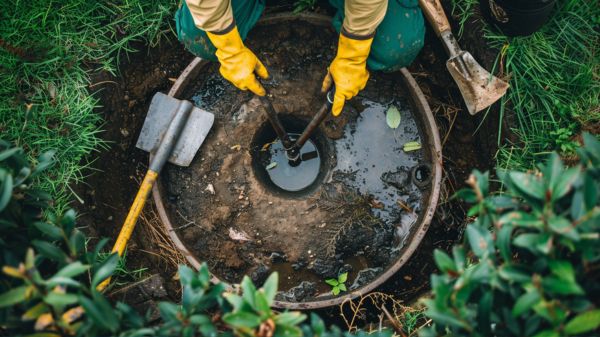The Truth About Septic Systems: Myths vs. Reality
Hey there! Are you tired of hearing all the false information about septic systems? Well, we’re here to set the record straight.
In this article, we’re going to debunk the top myths surrounding septic systems and give you the real facts. From the importance of regular pump-outs to what you should and shouldn’t flush down the drain, we’ve got you covered.
So sit back, relax, and let’s dive into the truth about septic systems together. You’re in for a myth-busting adventure!
Key Takeaways
- Regular pump-outs every two or three years are essential for maintaining a septic system and preventing dangerous levels of indigestible sludge buildup.
- It is important to be mindful of what goes into a septic system, as poisons like drain cleaner and bleach can harm sewage-digesting microbes and contribute to system failure.
- Flushing dead animals or using septic additives does not improve septic system performance and maintenance is more important.
- Proper management, including regular tank pumping, avoiding poisons, and maintaining the leaching bed, is crucial for the longevity of a septic system, which can last more than 20 years with proper care.
Septic Pump-Outs
Regular pump-outs are necessary to prevent the build-up of indigestible sludge and ensure the longevity of the septic system. Septic tank maintenance is crucial for maintaining a healthy and functioning system. It is recommended to pump the septic tank every two or three years to remove accumulated solids.
Avoid using septic additives that claim to eliminate the need for pump-outs, as they are risky and not scientifically proven. Pump-outs also play a vital role in preventing clogged leaching pipes. If indigestible solids are not removed, they can cause blockages and hinder the proper distribution of wastewater.
Importance of Drain Contents
Putting poisons like drain cleaner or disinfectants into a septic system can harm the sewage-digesting microbes. These harmful substances can diminish or eliminate the microbial balance that is crucial for the proper functioning of the septic system.
It is important to understand the impact of what goes into the drain and to practice proper waste disposal to maintain the system’s longevity. Household bleach, even in small amounts, can temporarily kill beneficial microbes. Coffee grounds, although seemingly harmless, are indigestible and can contribute to system failure.
Only wastewater and sewage should be put into a septic system to ensure its optimal performance. By practicing septic system maintenance and avoiding harmful substances, you can help maintain the microbial balance and protect the function of your septic system.
| Harmful Substances | Impact on Septic System |
|---|---|
| Drain cleaner | Harms sewage-digesting microbes |
| Disinfectants | Harms sewage-digesting microbes |
| Solvents | Harms sewage-digesting microbes |
| Household bleach | Temporarily kills beneficial microbes |
| Coffee grounds | Contributes to system failure |
Related Post: Septifix Tablets Review: Solved Septic Problems Made Easy!
Flushing Dead Animals
Flushing dead animals down the toilet does not provide the essential microbes that are already present in your septic system. While it may seem like a convenient disposal method, it offers no benefits to your septic system. In fact, it can pose risks and have negative environmental impacts.
Proper disposal of dead animals is important to ensure the health and longevity of your septic system. Instead of flushing them, it is better to contact local animal control or a professional waste disposal service for safe and proper disposal. This alternative not only eliminates the risks of flushing dead animals, but it also ensures eliminating the environmental impact.
Taking the time to dispose of dead animals properly is a responsible choice that contributes to the overall well-being of your septic system and the environment.
Lifespan of Septic Systems
Proper management and maintenance are crucial for maximizing the lifespan of septic systems. Here are four factors that can affect the lifespan of septic systems:
- Regular pump-outs: Pumping the septic tank every two or three years is essential. This prevents dangerous build-up of indigestible sludge and clogging of leaching pipes, ensuring the system’s longevity.
- Mindful drain contents: What goes into the septic system matters. Poisons like drain cleaners and solvents can harm sewage-digesting microbes, while coffee grounds can contribute to system failure. Only wastewater and sewage should be put into the system.
- Effective maintenance: Poor management can lead to system failure in as little as five years. Regular tank pumping, avoiding poisons, and maintaining the leaching bed increase the chances of a long working life.
- Restoration options: If a septic system becomes clogged, it can often be restored without replacement. Jetting, or high-pressure water cleaning, can clear out clogged leaching pipes and restore the system’s function indefinitely.
Restoring Clogged Septic Systems
To restore a clogged septic system, you can consider jetting, a high-pressure water cleaning technique that effectively clears out clogged leaching pipes.
Jetting is a simple and efficient solution that can often solve clogs caused by indigestible solids, slimy biomat growths, and tree roots without the need for system replacement.
Regular maintenance is crucial in preventing clogs and ensuring the longevity of your septic system. By pumping the septic tank every two to three years and avoiding the introduction of indigestible solids, you can reduce the risk of clogs and system failure.
It’s important to note that jetting is not only a short-term fix but can also help your septic system function indefinitely when done regularly.
Taking proactive measures and considering high pressure water cleaning can save you time, money, and the hassle of replacing your entire septic system.
Related Article: Septic Tank Problems: The Common Signs and The Solutions.
Frequently Asked Questions
Can Septic Additives Completely Eliminate the Need for Pump-Outs?
No, septic additives cannot completely eliminate the need for pump-outs. Regular septic tank maintenance and inspections are necessary to prevent system failures. It is important to follow septic tank regulations and not rely solely on alternative treatments.
Can Small Amounts of Household Bleach Harm the Septic Systems?
Small amounts of household bleach can harm your septic system. Bleach alternatives are a better choice for septic tank maintenance. Regular cleaning and care, without relying on additives, will keep your system running smoothly.
Is It Beneficial to Flush Dead Animals Down the Toilet for Septic System Health?
Flushing dead animals down the toilet does not benefit your septic system. Proper maintenance, regular inspections, and avoiding flushing chemicals are key to its health. Consider environmentally-friendly septic system alternatives for long-term sustainability.
What Is the Average Lifespan of a Septic System?
On average, a septic system can last more than 20 years. Proper maintenance, regular inspections, and avoiding harmful substances are crucial for its longevity. You should also consider the cost of installation and environmental impact.
Besides Replacement, What Are Some Effective Methods for Restoring a Clogged Septic System?
To restore a clogged septic system, effective methods include regular septic system maintenance, drain field rejuvenation, septic system inspection, septic tank pumping, and septic tank cleaning. These actions can help solve clogs and ensure proper system functioning.
Conclusion
It is important not to fall for the myths surrounding septic systems. Regular pump-outs are crucial to prevent the buildup of harmful sludge. It is also important to be mindful of what goes down your drains, as chemicals like drain cleaner and bleach can harm the microbes that digest sewage.
Flushing dead animals won’t benefit your system, so it is important to dispose of them properly. Additionally, it is important to remember that septic additives are unnecessary. Proper management and maintenance are key to a long-lasting system. If your septic system clogged, consider jetting as a solution.
By keeping your septic system functioning smoothly and avoiding the pitfalls of these common misconceptions, you can ensure the longevity and effectiveness of your septic system.







